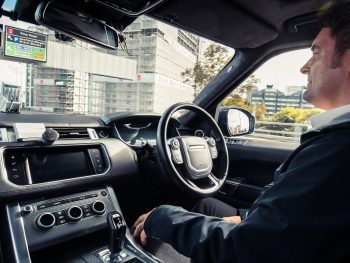Law reform vital for self-driving vehicle rollout, say UK MPs
MPs on the UK’s Transport Committee have called for the urgent introduction of new laws on self-driving vehicles (SDVs) to enable their introduction on UK roads.

MPs are calling for a Transport Bill in the next Parliamentary session, before the next general election
The committe’s new report makes a number of recommendations on how regulations should be updated to tackle concerns about safety and security, dilemmas over legal liability, as well as infrastructure that will be needed to accommodate their introduction.
And the MPs warn that failure to enact comprehensive legislation would do “significant and lasting damage both to the UK’s SDVs industry and the country’s reputation as a trailblazer”.
Transport Committee chair Iain Stewart added: “Thanks to the energy and creativity of the self-driving vehicles sector, the UK has a head start in developing a vision for how SDVs could be introduced. The Government’s strategy is one this committee broadly welcomes.
“Self-driving vehicles are a great British success story in the making and we have a competitive advantage over many other countries. But all that hard work could be at risk if the Government doesn’t follow through and bring forward a Transport Bill in the next Parliamentary session, before the next general election.”
The call comes after more than 50 transport technology organisations also urged the Prime Minister to push ahead with a Transport Bill, as promised in the 2022 Queen’s Speech, to enable mobility innovations.
Iain Stewart said widespread take-up of self-driving vehicles faced various hurdles, including public confidence in their safety, security and their potential to have knock-on impacts on other road users.
He also called for a considered approach in the rollout of such vehicles on UK roads.
“We believe the Government should take a cautious, gradual approach, with SDV technologies only initially introduced in well-defined contexts, or else we risk unintended consequences.”
While the Government originally said self-driving vehicles – referring to cars with semi-autonomous features – could be on UK roads by 2021, this was pushed back. It’s since unveiled plans for self-driving vehicles to have a full rollout by 2025 under its Connected & Automated Mobility 2025 legal framework. This followed a joint report from the Law Commissions of England, Wales and Scotland at the start of 2022 which called for the introduction of a new Automated Vehicles Act.
The Transport Committee said it commended the work of the Law Commissions and the Government in devising the new legal framework, which has “broad support, albeit with more detail needed in some areas”. But MPs said it was disappointing that the Government had not committed to legislating in this Parliament to “to put in place the robust regulatory framework it promised” – and called for the laws to cover vehicle approvals, liability for accidents, cybersecurity, and the use of personal data.
Definition of safe “too weak and too vague”

The committee has warned of a widespread assumption that self-driving vehicles will prove safer than human drivers
The committee also warned of a widespread assumption that SDVs would prove safer than human drivers – which it said was “not a given” and was based on SDVs becoming widely used on UK roads, which could be decades away, or assertions about human error that ignore other risks.
They’ve questioned the idea that self-driving vehicles will be “expected to achieve an equivalent level of safety to that of a competent and careful human driver” – saying that the definition is “too weak and too vague”.
MPs also highlighted that greater automation would reduce time spent driving, leading to concerns that drivers may become less practised and therefore less skilled over time.
And they said that the requirement for drivers to be ready to take manual control of a vehicle meant a risk of facing challenging scenarios with little notice.
Committee recommendations include possible changes to driving tests and a plan to ensure all drivers fully understand SDVs.
Others concerns hinge on cybersecurity, road worthiness and legal liability – all of which must be addressed further in a new regulatory regime.
Infrastructure will also need to be a high-priority issue, including well-maintained roads, as well as signage, nationwide connectivity, and up-to-date digital information about the road network.
Two final areas of concern are a possible impact on congestion and worse inequalities in transport access.
Transport Committee chair Iain Stewart added: “If the Government is going to meet its ambitions for self-driving vehicle deployment, these knotty issues need to be addressed.”
Thatcham Research supports call for urgent legislation
Thatcham Research has said it welcomes the report’s pragmatism regarding the advent of self-driving vehicles and the complex requirements for their successful adoption.
Tom Leggett, vehicle technology specialist at the vehicle safety and security specialist, said: “It encourages the Government to embrace self-driving technology cautiously and gradually, ensuring that the focus is on safe implementation, legal clarity and public acceptance. This can only be achieved by a unified approach by vehicle manufacturers, government and insurers.”
Thatcham also backed the urgent recommendation for more robust safety standards, warning that comparing self-driving cars to competent human drivers is insufficient.
“The question of “how safe is safe enough?” has long been a point of contention, and if the safety case is the primary benefit of self-driving vehicles, then this should be reflected in the Government’s ambitions for the future of transport. The UK is well positioned to lead the world in this endeavour, but it will only be achievable with data transparency.”
Thatcham also supported the report’s statement that a safety-led culture would require widespread access to data.
Leggett continued: “It is of huge significance that the report prioritises data access for all stakeholders. Thatcham Research has long called for a centrally held data repository to enable a fully transparent understanding of collision cause and effect, something which will also be vital to building trust and smoothing the path to consumer adoption. Widespread data access is also crucial for safety and the resolution of complex legal liability arrangements shared between vehicle owners and operators.”
Finally, Thatcham welcomed the report’s acknowledgments on the complexities of legal liability.
“The self-driving vehicle sector in the UK is regarded as a success story driven by various stakeholders’ energy, creativity, and expertise. However, we would also support the report’s call for the urgent introduction of comprehensive legislation to protect the UK’s reputation as a forerunner in the safe adoption of self-driving vehicles, with ongoing reviews and updates to keep pace with evolving technology.”
The AA also spotlighted further areas that will need urgent action to enable the safe rollout of fully autonomous cars.
Jack Cousens, head of roads policy, commented: “Road authorities will have to be more meticulous with the condition of the roads, particularly markings and signage that are critical for a self-driving car to navigate. Skimping on maintenance schedules to save money won’t be an option.”
He added that further changes would need to be made to ensure safe use of self-driving technologies, such as modernising the driving test.
“Following the boom in sat-navs, the practical test was updated to include a section on independent driving using a sat-nav so new drivers were taught how to use them correctly.
“Car technology is evolving all the time and many driver assistance technologies such as adaptive cruise control and lane keep assist are firm favourites. While these tools are widely accepted, the mindset of drivers changes when they are asked to consider relinquishing control to a fully self-driving car.
“Drivers are nervous about a road network consisting of both fully autonomous cars driving alongside cars with humans behind the wheel, but with education, training and rigorously tested technology people may be persuaded to let the car do the driving.”
The Transport Committee report on self-driving vehicles is available here.


